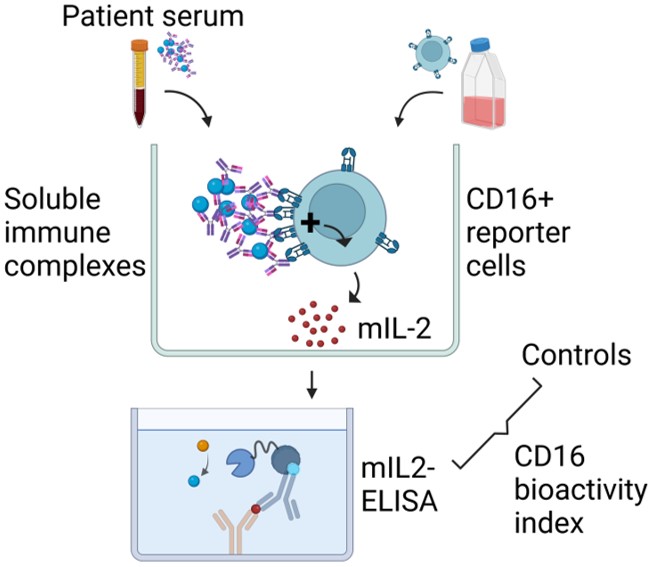Session Information
Date: Tuesday, October 28, 2025
Title: (1855–1876) Systemic Sclerosis & Related Disorders – Basic Science Poster II
Session Type: Poster Session C
Session Time: 10:30AM-12:30PM
Background/Purpose: The role of autoantibodies in systemic autoimmunity, such as connective tissue diseases (CTD), has been recently highlighted by the successful treatment with CD19-targeting CAR-T cells. Although many downstream effects of autoantibodies require immune complex formation as to activate low-affinity IgG/Fcγ-receptors (FcγRs), circulating immune complexes (cICs) have experienced far less attention in the last decade. In fact, clinical testing of cICs, and thus thorough investigation of this potential chain link between adaptive and innate immune mechanisms, was impeded by lacking reliable detection methods. We have recently overcome methodological limitations by introducing a novel reporter cell assay that directly measures the presence of cICs in untreated serum with high sensitivity via their functional engagement to single FcγRs.
Methods: Here, we used a comprehensive reporter cell panel to assess the presence of cICs in autoantibody-positive CTD patients (cross-section analysis) and in eight patients treated with CD19.CAR-T cells (longitudinal analysis).
Results: The bioactivity of cICs in the CTD cohort was highly significantly elevated compared to healthy individuals and patients with autoantibody-negative psoriatic arthritis. Analyses of individual diseases indicated that cICs were present in sera from all CTD, including systemic sclerosis (SSc) and primary Sjögren’s syndrome (SjS). FcγR-activation of cICs was heterogeneous within disease entities and correlated with the extent of cutaneous and lung manifestations in SSc, indicating pronounced cIC-bioactivity in the more systemic disease forms. In patients treated with CD19.CAR-T cells, the bioactivity of cICs was significantly reduced.
Conclusion: In summary, our study closes a knowledge gap by proving the presence of FcγR-engaging cICs that can be associated with clinical parameters and treatment in systemic autoimmune diseases.
 Graphical overview of the reporter cell model used to determine the bioactivity of circulating immune complexes in patient sera at Fc-receptors such as CD16. Sera are diluted in assay medium without other processing steps.
Graphical overview of the reporter cell model used to determine the bioactivity of circulating immune complexes in patient sera at Fc-receptors such as CD16. Sera are diluted in assay medium without other processing steps.
To cite this abstract in AMA style:
Freitag M, Claus M, Kolb P, Falcone V, Andreeva I, Blank N, Lorenz H, Schett G, Merkt W. Fcγ-receptor activation by circulating immune complexes in autoimmunity and CD19.CAR-T cell therapy [abstract]. Arthritis Rheumatol. 2025; 77 (suppl 9). https://acrabstracts.org/abstract/fc%ce%b3-receptor-activation-by-circulating-immune-complexes-in-autoimmunity-and-cd19-car-t-cell-therapy/. Accessed .« Back to ACR Convergence 2025
ACR Meeting Abstracts - https://acrabstracts.org/abstract/fc%ce%b3-receptor-activation-by-circulating-immune-complexes-in-autoimmunity-and-cd19-car-t-cell-therapy/
